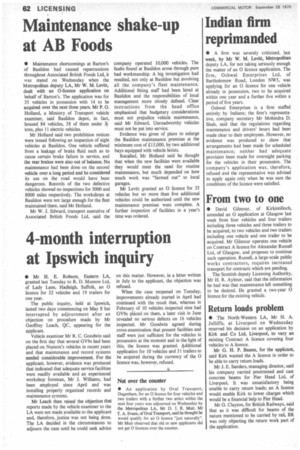Maintenance shake-up at AB Foods
Page 64

If you've noticed an error in this article please click here to report it so we can fix it.
• Maintenance shortcomings at Barton's of Basildon had caused repercussions throughout Associated British Foods Ltd, it was stated on Wednesday when the Metropolitan deputy LA, Mr W. M. Levitt, dealt with an 0-licence application on behalf of Barton's. The application was for 35 vehicles in possession with 14 to be acquired over the next three years. Mr P.O. Holland, a Ministry of Transport vehicle examiner, said Basildon depot. in fact, housed 84 vehicles, 38 of them under 3itons, plus 11 electric vehicles.
Mr Holland said two prohibition notices were issued following an inspection of eight vehicles at Basildon. One vehicle suffered from a leakage of brake fluid such as to cause certain brake failure in service, and the rear brakes were also out of balance. No maintenance had been done on the second vehicle over a long period and he considered its use on the road would have been dangerous. Records of the two defective vehicles showed no inspections for 5000 and 8000 miles respectively. The workshops at Basildon were not large enough for the fleet maintained there, said Mr Holland.
Mr W. J. Edward, transport executive of Associated British Foods Ltd, said the company operated 10,000 vehicles. The faults found at Basildon arose through pure bad workmanship. A big investigation had resulted, not only at Basildon but involving all the company's fleet maintenance. Additional fitting staff had been hired at Basildon and the responsibilities of local management more closely defined. Clear instructions from the head office emphasized that budgetary considerations must not prejudice vehicle maintenance, said Mr Edward. Unroadworthy vehicles must not be put into service.
Evidence was given of plans to enlarge the Basildon maintenance premises at the minimum cost of £15,000, by two additional bays equipped with vehicle hoists.
Recalled, Mr Holland said he thought that when the new facilities were available they would meet the need for routine maintenance, but much depended on how much work was "farmed out" to local garages.
Mr Levitt granted an 0 licence for 35 vehicles but no more than five additional vehicles could be authorized until the new maintenance premises were complete. A further inspection of facilities in a year's time was ordered.


























































































































































































